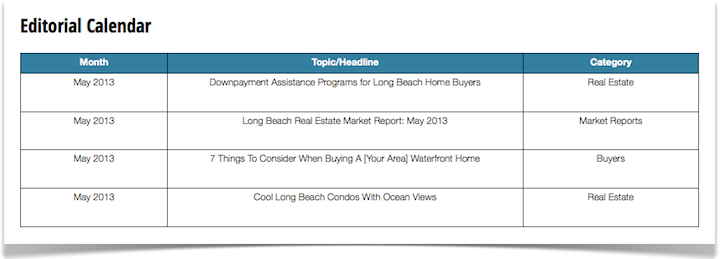To rank well, build a site so fantastic that it makes you an authority in your niche. – Matt Cutts, Head of the Google Web Spam Team
 In real estate, every agent is competing to position themselves as the local market authority.
In real estate, every agent is competing to position themselves as the local market authority.
But how do you position yourself as the “Go To” expert when everyone else is also vying for that position?
How do you build your authority so that consumers will want to work with you instead of John Doe Realtor down the street?
Here’s a 5 step plan for building a website that demonstrates your authority and helps position you as the local market expert…
Step #1: Research your audience.
First and foremost, you need to determine who it is you’re trying to reach. Do you want to work with buyers or sellers?
If you try to be everything to everyone, you’ll attract a lot of nothing.
Instead, specialize.
Get specific about the type of client you’d like to work with. You’ll attract a specific type of client this way, faster.
Once you’ve identified him or her, and the type of client they are (buyer or seller), ask yourself the following:
- What types of questions are they asking that you can provide answers to?
- What are they interested in learning about the neighborhood?
Make a list of everything they might be interested in learning about buying or selling real estate in your area. This list will serve as the foundation of your content for your new authoritative website.
Step #2: Perform keyword research to identify the type of language your audience is using.
Once you’ve identified the type of client you’d like to work with, it’s important to understand the type of language that they’re using to search for homes online. This way, you can optimize your content to rank well for those search phrases.
Use tools like Google’s Keyword Tool and WordTracker to identify search terms that your target audience is using. The higher you rank for these terms, the more likely it is that your intended audience will find you in search results.
Step #3: Research the competiton.
Not in a “I’m lazy, and I’m going to copy your work” kind of way, but rather to identify what others are already doing in your market area.
- What are they doing right?
- What are they doing wrong?
- And more importantly, what can you do better?
Step #4: Write content that demonstrates your expertise over the local market.
Using the knowledge that you’ve gathered in steps #1 & #2, begin to write content that demonstrates your expertise over the local market area. Things like:
- Write about the buying (or selling) process in detail.
- Write local market reports.
- Write about the financing process.
- Write local business reviews.
- Write about upcoming events and things to do around the community.
The more consistently you share what you know, and the more useful it is, the more you’ll attract people seeking your professional expertise.
For example, Real Estate Broker Irina Netchaev has been featured in Pasadena Weekly, SGV Tribune Newspapers, Pasadena Star News, American Express OpenForum and HGTV.
Step #5: Design and organize your website so that it highlights your best content and properly communicates what you have to offer.
The problem with most real estate websites is that content is often very poorly organized.
- Too many categories,
- The same content in every category.
- Too many pages in the navigation.
- Poor, or no, Calls To Action.
et cetera.
Instead, design your site so that it highlights your best content and properly communicates the value that you have to offer.
Case Studies: 4 Blogs That Dominate Their Local Market Area
When you combine all of these elements together, what you get is an authoritative website that ranks well in search engines.
Here are a few sites that have done this well in their respective market areas: AnthonyGilbert.com, PasadenaViews.com, Miamism.com, and PhoenixRealEstateGuy.com.
How did they position themselves as the local market experts?
Simple, they consistently share what they know about the market. They engage prospects with useful content rather than hitting them with pitch after pitch.





